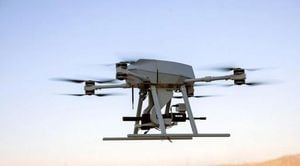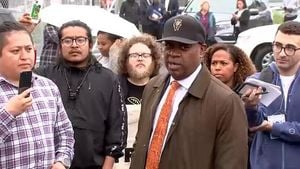LONDON (AP) — The end of World War II in Europe, which occurred 80 years ago on May 8, 1945, is a day marked by both celebration and reflection. While it symbolizes the defeat of Nazi Germany and the restoration of peace across the continent, this year's commemoration is tinged with a sense of dread, as the specter of modern conflicts looms large.
On this significant anniversary, leaders across Europe have acknowledged the importance of remembering the past while recognizing the current threats to peace. German President Frank-Walter Steinmeier expressed profound gratitude towards the Allied soldiers and European resistance movements that fought against the Nazi regime. "It was Germans who unleashed this criminal war and dragged all of Europe with them into the abyss," Steinmeier stated in a parliamentary address. "Today, 80 years later, our profound thanks still go to the Allied soldiers and the European resistance movements who mustered all their strength and endured great losses to defeat the Nazi regime."
However, Steinmeier also warned that the current geopolitical climate is anything but secure. "We are not celebrating this 8 May today in a spirit of calm self-assurance. Because we can see that freedom is not the grand finale of history," he cautioned. The rise of right-wing populism in several EU member states and the ongoing war in Ukraine, triggered by Russia's full-scale invasion in 2022, have cast a shadow over the festivities.
The United States played a crucial role in the Allied victory, particularly during the D-Day invasion of Normandy on June 6, 1944, which marked a turning point in the war. On the eve of V-E Day, former President Donald Trump proclaimed May 8 as a day for the United States to celebrate its victory in World War II, urging recognition of the country’s vital contributions. "We are going to start celebrating our victories again!" he declared.
As Europe commemorates this historic day, the situation in Ukraine remains dire. The country, which suffered immensely during WWII, continues to fight against Russian aggression. Ukraine's President Volodymyr Zelenskyy emphasized the personal connection many Ukrainians have with the memories of the war. An estimated 8 million Ukrainians were killed during WWII, including 5 million civilians and 3 million soldiers. "For Ukraine, the memory of WWII is more than historical; it is personal, lived, and once again painfully relevant," he noted.
Across Europe, May 8 is observed as a Day of Remembrance and Reconciliation, honoring those who lost their lives and reflecting on the shared goal of peace. In London, a service was held at Westminster Abbey, attended by members of the royal family who took time to converse with veterans. U.K. Prime Minister Keir Starmer emphasized the importance of remembering the values of freedom and democracy, stating, "The idea that this was all just history and it doesn’t matter now somehow, is completely wrong."
In France, President Emmanuel Macron led a wreath-laying ceremony in Paris, paying tribute to General Charles de Gaulle, who played a pivotal role in resisting Nazi occupation. Meanwhile, in Berlin, Chancellor Friedrich Merz laid a wreath at the central memorial for the victims of war and tyranny, highlighting Germany's transformation into a beacon of democracy.
Symbolically, as Europe reflects on its past, Russia will celebrate its Victory Day one day later, on May 10, 2025, with a military parade in Moscow. This stark contrast raises questions about the narratives surrounding WWII and the current geopolitical tensions.
Jack Appel, a 101-year-old veteran who witnessed the horrors of the Buchenwald concentration camp, shared his reflections on the significance of V-E Day. "World War II was a major, major fight for civilization," he told USA TODAY. Appel, who served in the U.S. Army Signal Corps, recalled the atrocities he witnessed and the importance of the fight against tyranny. "There’s hardly a day that goes by without someone saying to me, 'Thank you for your service,'" he remarked, emphasizing the purpose behind their sacrifices.
The memories of WWII remain crucial as the world grapples with new forms of aggression. The Kremlin has been accused of manipulating the narrative of the war, obscuring the Soviet Union's role as a co-aggressor in the early years. This distortion, particularly the glorification of the "Great Patriotic War," undermines the principles of peace and justice established in 1945.
As the world observes this significant anniversary, it is essential to honor the lives lost and the lessons learned from a conflict that shaped the modern world. The fight against oppression and the pursuit of freedom continue to resonate today, reminding us that the principles forged in the aftermath of WWII are still under threat.
In conclusion, the 80th anniversary of V-E Day serves as a poignant reminder of the sacrifices made in the name of freedom and the ongoing struggles faced in upholding those values. As Europe celebrates its past, it must also confront the challenges of the present, ensuring that the lessons of history are not forgotten.





